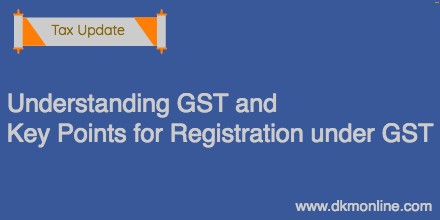The businesses in India have been driven evidently by the Indirect Taxes and these taxes have led to restructuring and remodeling of major business operations and systems owing to changes in taxes and costs involved. And proposed GST is evidently the most talked about tax, so let us understand what is GST and what will be the advantages of registering your business under GST.
The government defines GST as, a destination based tax on consumption of good and services. The proposal of GST is to levy it at all stages beginning the manufacturing up to the final consumption with credit of taxes paid at previous stages available as setoff.
We can say that the burden of tax is to be borne by the final consumer. The government proposes that the taxing authority which has jurisdiction over the place of consumption which is also termed as place of supply.
Though there are lot of reservations, doubts and excitement related to GST in among the business owners, experts suggest that it will be beneficial to register in GST. Let us have a look:
Advantages of Registration in GST:
1. Your business will become legally recognized as the supplier of goods and services you intend to render under your business.
2. You will be legally authorized service or goods provider to collect tax from the purchasers and also pass on the credit of taxes paid on the goods and services supplied to buyers or clients.
3. It will enable proper accounting of taxes paid on the services rendered and the same can be utilized for payment of GST dues on supply of good or services.
Some Key Points for Registration in GST:
1. Also note a person without GST cannot collect GST from his customers and neither can they claim any input tax credit of GST paid by him. This makes Registration in GST all the more significant.
2. Who is liable to take Registration under the Model GST Law: The suppliers who carry on any business anywhere in India and the turnover of whose exceeds threshold limits as prescribed within a year are liable to get registered. However certain categories mentioned in Schedule III of MGL will be liable for registration irrespective of the threshold. There are also few sectors like agriculture which are exempted and shall not be liable to take registration.
3. Time limit for Registration in GST Model Law is set to be within 30 days from the date of liability for registration.
4. If a person is working and operating from different states with the same PAN number and is liable to take a registration, will have to get registered separately for each State from where h/she is operating business from and shall pay GST in terms of Sub-section (1) of Section 19 of Model GST Law.
5. In case of multiple business verticals in a single state, as per sub-section (2) of Section 19, a person may obtain a separate registration for each business vertical subject to such conditions as prescribed.
6. PAN card issued under the Income Tax Act, 1961(43 of 1961) is mandatory for eligibility for the grant of registration under Section 19 of the Model GST Law.
7. Voluntary Registration under Sub-section (3) of Section 19 is also possible in the Model GST Law and all provisions of this Act, as are applicable to a registered taxable person.
8. Any registration in GST done through the right procedure is considered permanent unless surrendered, cancelled, suspended or revoked.
9. Amendments to any registration certificate are permissible in terms of Section 20 through an officer on the basis of the information furnished either by registrant or ascertained by him. However, permissions from the designated officer will be required for making amendments for certain core fields of information.
10. Cancellation of a Registration is granted through a designated officer in circumstances mentioned in Section 21 of the Model GST Law.
11. A designated officer is permitted to cancel the registration in certain circumstances specified under section 21(2) of model GST law. The circumstanced include
a. Not filing return for a period of 6 months (for a normal taxable person) or 3 months (for a compounding taxpayer).
b. Not commencing business within 6 months from date of registration.
The officer must follow the principles of natural justice before cancelling the registration.
12. In case a registration is found to be obtained by means of willful mis-statement, fraud or suppression of facts, a designated officer can cancel the registration with retrospective effect by a designated officer. This is detailed under Section 21 (3).
Above are the key-points relevant to Registration of a business under GST. The Model GST Law is a subject in itself and needs detailing. The post is intended for sharing the updates and also to educate our readers about the upcoming trends in accounting and taxation. If you seek any clarity on Model GST Law feel free to comment here or get in touch with us. Our designated teams in Legal & Compliance department is happy to help.

